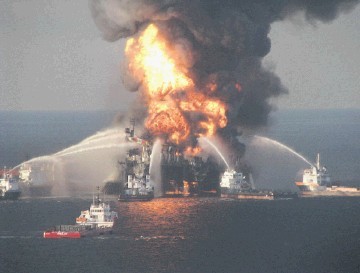
A last-minute settlement between the US Justice Department and oil giant BP over the Gulf of Mexico oil spill looks unlikely before the US presidential election on November 6.
Neither the justice department nor President Barack Obama, whose race with challenger Mitt Romney is deadlocked in most polls, want to appear to politicise a deal. And Mr Obama appears to face more potential risks than benefits from any settlement at this point.
BP has been locked in a year-long legal battle with the US government and Gulf Coast states to settle billions of dollars in civil and potential criminal liability from the 2010 explosion aboard the Deepwater Horizon rig that killed 11 workers and polluted the shorelines of four Gulf Coast states in the worst offshore spill in US history.
BP and the justice department have had protracted closed-door negotiations on a settlement to avoid a potentially years-long court battle.
But experts say that any settlement with BP would be complex and allow Mr Obama’s critics to attack him. “No matter what the president does, he can’t win on this one because it’s not going to be good enough for someone,” said James Lucier, managing director at Capital Alpha Partners in Washington. Last Friday, a federal judge delayed until February 2013 the start of a massive trial to determine liability for the Deepwater Horizon spill, citing tourist events that will keep New Orleans’ hotels booked. Meanwhile, BP will face questions tomorrow over the impact of its recent £16.7billion deal with Russia’s Rosneft when it unveils its third-quarter results. State-backed Rosneft agreed to buy BP’s 50% stake in its troubled TNK-BP joint venture for £10.7billion in cash and £6billion worth of Rosneft shares.
Investors have been left wondering how they will benefit from the deal, which will see BP grab a 19.75% stake in Rosneft as it becomes the world’s biggest publicly-traded oil company. BP shareholders are pushing for cash to be returned to them. Stuart Joyner, analyst at Investec, said: “We see potential for a special dividend.”
Meanwhile, BP will count the cost of its far-reaching disposal plan as lower production could trigger a 25% slide in quarterly profits.
It is expected to report underlying replacement cost profits of £2.5billion in the three months to the end of September. BP is becoming an increasingly smaller company as it sells off large chunks of its business as part of its pledge to raise cash to pay the costs of the Deepwater Horizon disaster.